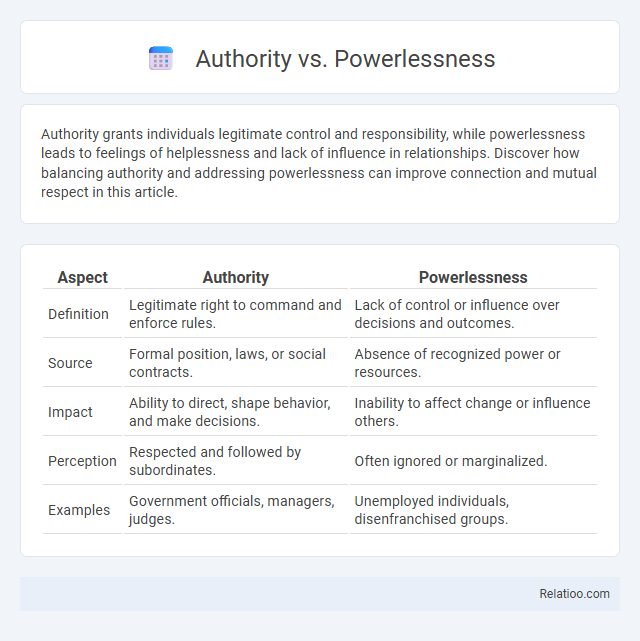Authority grants individuals legitimate control and responsibility, while powerlessness leads to feelings of helplessness and lack of influence in relationships. Discover how balancing authority and addressing powerlessness can improve connection and mutual respect in this article.
Table of Comparison
| Aspect | Authority | Powerlessness |
|---|---|---|
| Definition | Legitimate right to command and enforce rules. | Lack of control or influence over decisions and outcomes. |
| Source | Formal position, laws, or social contracts. | Absence of recognized power or resources. |
| Impact | Ability to direct, shape behavior, and make decisions. | Inability to affect change or influence others. |
| Perception | Respected and followed by subordinates. | Often ignored or marginalized. |
| Examples | Government officials, managers, judges. | Unemployed individuals, disenfranchised groups. |
Understanding Authority: Definition and Significance
Authority represents the legitimate power granted to an individual or institution to influence and enforce rules, ensuring social order and organizational effectiveness. Understanding authority involves recognizing its foundation in accepted norms, legal frameworks, and ethical standards that distinguish it from mere coercion or force. Your awareness of authority's significance enhances decision-making, promotes accountability, and fosters respect within interpersonal and institutional relationships.
Defining Powerlessness: Key Characteristics
Powerlessness is characterized by a lack of control over one's circumstances, feelings of helplessness, and diminished influence in decision-making processes. Individuals experiencing powerlessness often encounter barriers that prevent them from asserting their rights or accessing necessary resources, reinforcing a cycle of dependency and vulnerability. Understanding your own sense of agency is crucial to recognizing powerlessness and finding pathways to regain authority and self-efficacy.
Historical Perspectives on Authority and Powerlessness
Historical perspectives on authority reveal its evolution from centralized monarchies to modern democratic institutions, highlighting shifts in power distribution and governance. Powerlessness often emerged in marginalized groups during feudal eras and colonial periods, illustrating social hierarchies and systemic oppression. Despair associated with powerlessness is documented in various revolutions and social movements, where oppressed populations challenged authority to reclaim agency and rights.
Psychological Impact of Authority vs Powerlessness
The psychological impact of authority versus powerlessness significantly influences individual behavior and mental health outcomes, with authority often linked to increased self-efficacy and control, while powerlessness correlates with feelings of helplessness and heightened stress. Studies reveal that individuals experiencing powerlessness may develop learned helplessness, leading to diminished motivation and increased vulnerability to anxiety and depression. Conversely, possessing authority fosters a sense of agency and competence, which enhances resilience and psychological well-being.
Authority in Leadership: Benefits and Risks
Authority in leadership establishes clear direction, enhances decision-making efficiency, and fosters respect among team members, resulting in improved organizational performance and goal achievement. However, excessive reliance on authority can lead to power imbalances, reduced team autonomy, and potential resistance or disengagement from employees. Balancing authoritative leadership with empathy and collaboration mitigates risks while maximizing the benefits of strong leadership influence.
Societal Structures Fueling Powerlessness
Societal structures often reinforce powerlessness through systemic inequalities embedded in education, employment, and legal systems, marginalizing vulnerable populations. Institutional barriers limit access to resources and decision-making, perpetuating cycles of disenfranchisement and despair. These dynamics exacerbate feelings of helplessness, hindering individuals' ability to assert authority and influence their circumstances.
Navigating Power Dynamics in the Workplace
Navigating power dynamics in the workplace requires understanding the balance between authority, powerlessness, and despair to foster a healthy organizational culture. Effective leaders leverage authority to empower employees, avoiding the pitfalls of powerlessness that lead to low morale and disengagement. Addressing feelings of despair through transparent communication and support systems enhances resilience and productivity among teams.
Strategies to Shift from Powerlessness to Empowerment
Strategies to shift from powerlessness to empowerment involve recognizing your inherent authority and embracing proactive decision-making techniques. Cultivating self-awareness through mindset shifts and setting achievable goals strengthens resilience against feelings of despair. Engaging in assertive communication and seeking supportive networks enhances your capacity to regain control and foster personal empowerment.
Authority Abuse: Warning Signs and Consequences
Authority abuse often manifests through coercive control, manipulation, and intimidation, which undermine Your autonomy and sense of safety. Warning signs include excessive demands, disregard for boundaries, favoritism, and punitive actions that create a toxic environment. Consequences of unchecked authority abuse can lead to diminished trust, emotional distress, and long-term psychological harm, impacting both personal well-being and organizational health.
Building Balanced Relationships: Bridging Authority and Inclusion
Building balanced relationships requires navigating the tension between authority, powerlessness, and despair by fostering mutual respect and inclusive communication. Effective leadership integrates authoritative guidance with empathetic listening, empowering individuals and reducing feelings of powerlessness. Creating environments where voices are valued bridges gaps, mitigates despair, and strengthens collaborative bonds.

Infographic: Authority vs Powerlessness
 relatioo.com
relatioo.com